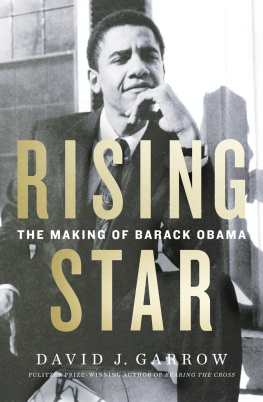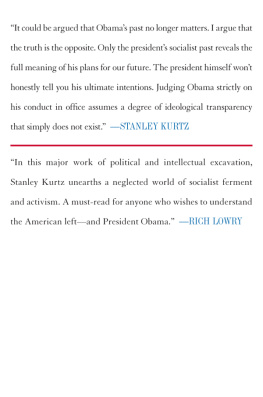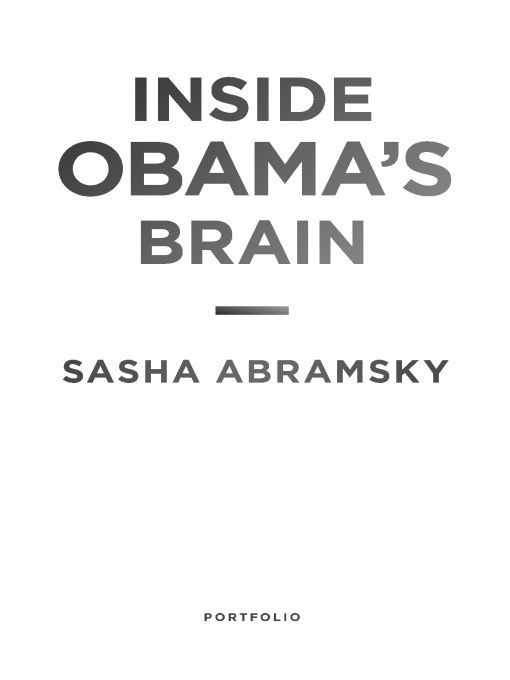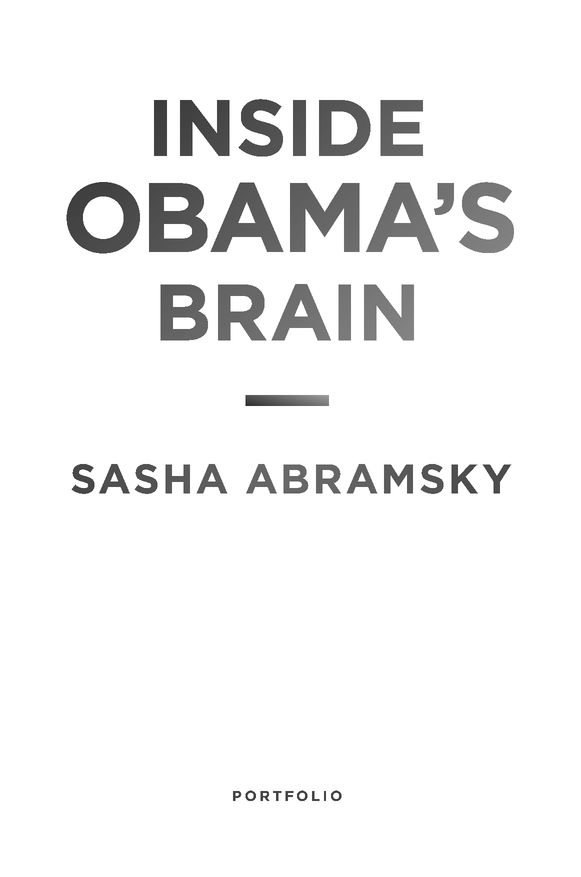Table of Contents
To Sofia and Leo
May every good dream come true.
INTRODUCTION
SETTING THE STAGE
On a cold, windy, winters day, Barack Obama looked down from his podium at the base of the Lincoln Memorial and surveyed the crowd. Even by Obama-mania standards, it was enormous. Hundreds of thousands of people were packed into the open spaces of the National Mall. They had traveled from all across the United States to be in the nations capital. Many had journeyed from overseas. They had come, bundled up against the chill, to watch, and to listen to, history unfold.
This gathering, a star-studded musical extravaganza on the last Sunday of George W. Bushs presidency, was a prelude. Two days later Obama was going to be inaugurated as the countrys forty-fourth president. Standing directly in front of the great stone statue of a seated Abraham Lincoln, three flags planted on either side of him, Obama, as he had done so many times during the election campaign, let his words soar skyward. As I prepare to assume the presidency, he declared, his tone deep and sonorous, yours are the voices I will take with me every day I walk into that Oval Officethe voices of men and women who have different stories but hold common hopes; who ask only for what was promised us as Americansthat we might make of our lives what we will and see our children climb higher than we did. It is this thread that binds us together in common effort; that runs through every memorial on this mall; that connects us to all those who struggled and sacrificed and stood here before.
Washingtons monuments loom large in American pageantry. They bring the past to life, or rather our visions of the past. Thus was inauguration organizer Emmett Beliveaus decision to go beyond mere parades and brass bands and to put together a top-talent concert at the Lincoln Memorial two days before the swearing-in ceremony intended as a conscious nod to a noble heritage. It was designed to signify renewalor, if you think more in marketing terms, a rebrandingof America; a reclaiming of destiny; a sense of the American ideal, contained within the original founding documents, finally within reach of being realized. It was meant to summon the ghosts of generations past to this new cause. Abolitionists. Suffragettes. Nineteen-thirties trade unionists. Second World War GIs. Civil rights protesters.
The concert was supposed to redefine who and what constituted America, from the opening piece, Aaron Coplands majestic Lincoln Portrait, through to the finale, eighty-nine-year-old Pete Seeger, backed by Bruce Springsteen, singing the full-length, infused-with-radicalism version of This Land Is Your Land. There was the imagery, projected on huge screens above the podium and along the mall, and reproduced on millions of television screens around the world, of ordinary workers doing their jobs throughout the land. There was the visual tribute to the African American singer Marian Anderson, denied permission to sing in Washington in the late 1930s by the Daughters of the American Revolution, brought to perform on the Mall afterward at the invitation of First Lady Eleanor Roosevelt. The America of the recent past, the program might have read, the country that lavished wealth and attention on the few while neglecting the needs and stories of the many, is being ushered out today. Welcome to the unveiling of a new-model America. Welcome to a new beginning.
Something transformative had occurred in the national conversation through the long primary campaign and then the presidential election season leading up to November 4, through the long weeks preceding the inauguration, and then during the inauguration festivities themselves. Catalyzed by the person and words of Obama, America, collectively, engaged in a discourse, around race and around identity, around national visions of progress and community, that has likely forever altered the countrys own self-image as well as the image of the United States seen by the rest of the world. The Sunday after the election, New York Times journalist Michael Sokolove, reporting on Levittown, Pennsylvania, voters overwhelming support for Obama, wrote that the nation was transformed on Tuesday but what had to occur first was the transformation of individual voters.
Over a period of months, millions of those voters had confronted their own prejudices, their own sets of expectations as to what a real American was; and, come Election Day, they decided they could, after all, vote for a black man who had built a political career out of listening to ordinary people tell the stories of their lives. The excitement of crowds not just in America but around the world that night was, at least in part, an excitement born of the realization that what it meant to be an American had forever changed.
Such moments occur rarely in a nations history. And when they do, the people behind them inevitably become the focus of our intense attention. While we might not want to literally explore the contours of Barack Obamas brain, we do very much, as a culture, want to understand how that brain works, what passions animate the forty-fourth president, what ideas and which individuals inhabit the mental recesses of this enigmatic figure. Thats why Obamas every move is so obsessively scrutinized. What sort of dog will he buy for his daughters? What kind of mental anguish did he go through before deciding to release the torture memos from the Bush era? At the press conference commemorating his first one hundred days in office, an enterprising New York Times reporter even asked the president what experiences he had found most enchanting during his three-plus months as occupant of the White House.
In a very real way, we want answered the question what makes Obama tick? That core question is what Inside Obamas Brain sets out to answer. To do so, one has to ask a host of smaller questions: How does he approach problems? What ideas and intellectual theories make up his political credo? How does he communicate with friends and foes? How do his many skills play out in his chosen fields, the worlds of writing, organizing, law, and politics? And why is it that so many people not just in the United States but around the world are so seducedand so willing to be seducedby his words and his presence?
The responses, provided by relatives, friends, and colleagues from the many layers of Obamas extraordinary life, and by his own wordsput forth in his books and essays, in media interviews spanning more than a decade, and in numerous campaign speeches and political meetingsreveal the complexity of a man who has become something of a mythical figure in his own lifetime.
In his place in the countrys history, President Obama is, in many ways, a successor figure to Martin Luther King Jr. and his vision of a beloved community moving America away from its divided, segregated past; he is the lead member of what New Yorker editor David Remnick and others have termed the Joshua Generationthe generation of highly educated, professionally employed African Americans provided not only with a sense of possibility by those who came before (the so-called Moses Generation, who broke down the legal structures of segregation) but also with a powerful sense of mission and obligation.
To supporters and critics alike, Obama is seen as a once-in-a-lifetime charismatic leader. To his more extreme critics from the conservative fringedie-hards convinced that he is a Manchurian candidate with a covert plan to undermine the American way of lifein seeking to claim the drivers seat within the Joshua Generation, Obama has shown himself to be a man of messianic pretensions with a naive following almost religious in its fervor. To at least some of his supporters, he exhibits the rare power to shift the tectonic plates of history through the sheer force of his willwithout apparent irony, Oprah Winfrey introduced him to huge crowds as the One. In an open letter to the victorious candidate written immediately after the election, the author Alice Walker wrote that he was a balm for the weary warriors of hope, previously only sung about. His position as one of American historys most charismatic figures presents a great paradox, since for much of Obamas early career, he warned against community movements built around the magnetic presence of individuals. An overreliance on charisma, he believed, was ultimately why Chicagos first African American mayor, Harold Washington, a man whose photo hung on a wall of his office while he was a state senator, failed to create a movement capable of outliving him.






